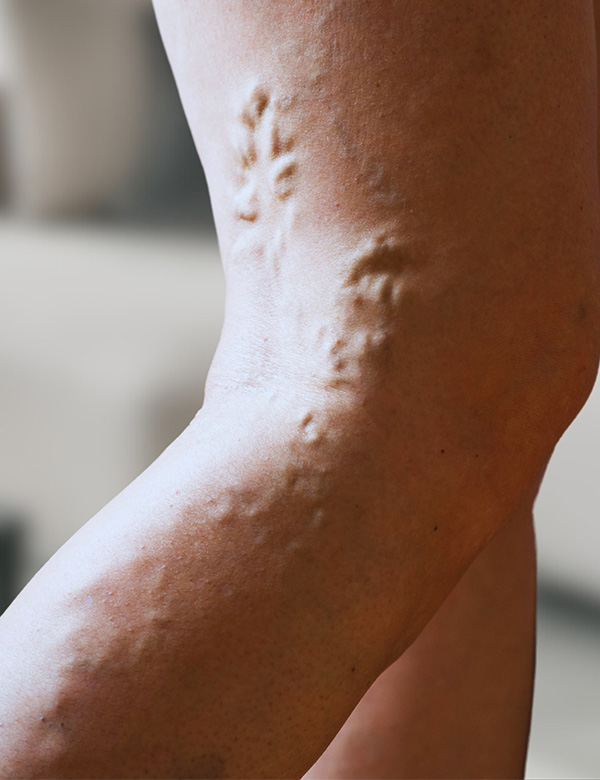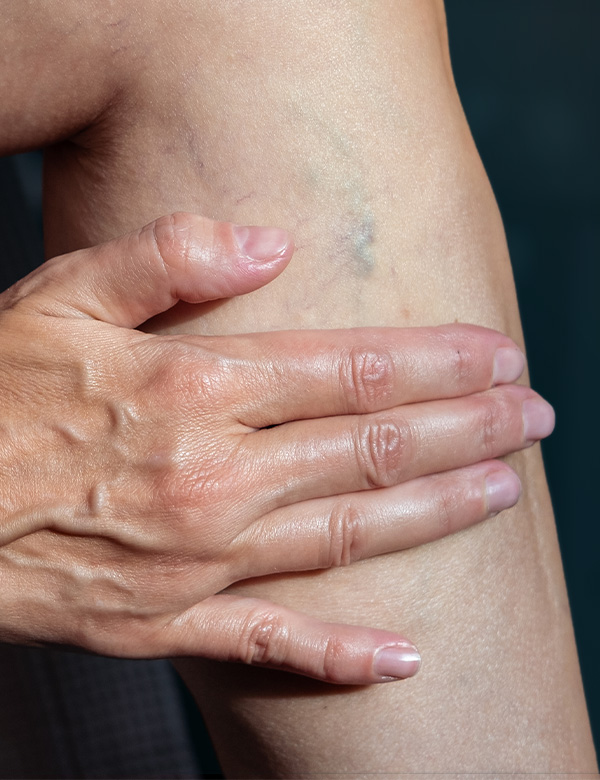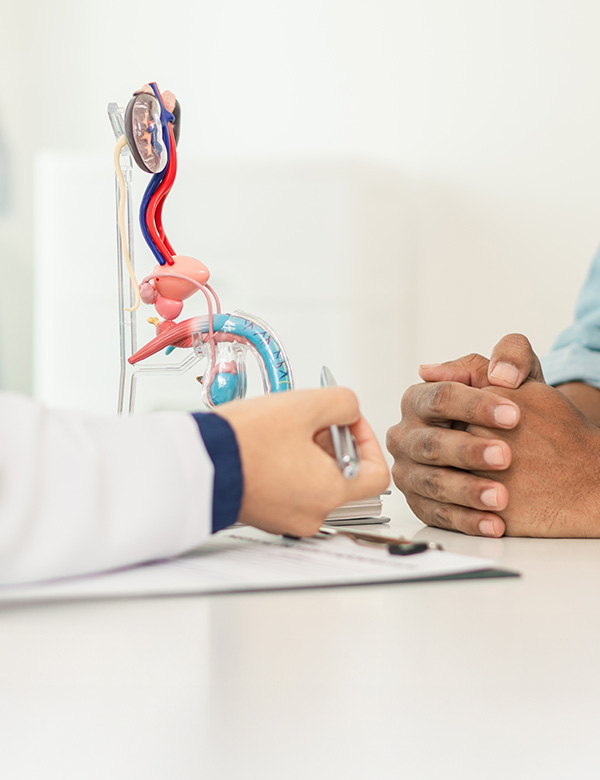Diagnose Lymphedema
Diagnose Lymphedema – Diagnosis and Treatment by a Vascular Specialist at Derma Medical Clinic in Zurich – Sihlcity
Lymphedema
Chronische Abszesse und schmerzhafte Knoten durch erfahrenen Hautarzt abklären und behandeln in der Derma Medical Clinic in Zürich - Sihlcity
Persistent swelling in arms, legs, hands, and feet: Recognize and treat lymphatic system congestion
Examinations
Vascular screening
Vascular ultrasound
If required: Lymphoscintigraphy
Procedure
Initial Consultation
Ultrasound
Duration
approx. 45 minutes
Lymphedema at a Glance
When is a Lymphedema Diagnosis Advisable?
What is Lymphedema?
Lymphedema occurs when the fine lymphatic vessels can no longer adequately drain fluid.
The lymphatic system is a network of vessels that returns fluid, proteins, and immune cells from the tissues back into the bloodstream. It is therefore part of our immune system and a kind of “cleansing system” for the body.
The result of impaired drainage is persistent swellings, which can later lead to skin hardening and promote infections.
Lymphedema is often confused with
lipedema
or venous insufficiency. An accurate diagnosis is therefore crucial to begin the correct therapy.
Lymphedema often develops after cancer treatment or surgery, when lymph nodes are removed or lymphatic vessels are damaged.
An examination is recommended if you…
- notice permanently swollen legs, arms, or feet,
- feel a feeling of tension or heaviness in the limbs
- have repeatedly had infections or inflammations in the affected area
- notice that the skin increasingly thickens or hardens
- develop swellings after surgery, radiation, or lymph node removal
- already know of cases of congenital lymphedema in the family or have observed swellings themselves since youth
- Notice a persistent new swelling after surgery

When is a Lymphedema Diagnosis Advisable?
What is Lymphedema?
Lymphedema occurs when the fine lymphatic vessels can no longer adequately drain fluid.
The lymphatic system is a network of vessels that returns fluid, proteins, and immune cells from the tissues back into the bloodstream. It is therefore part of our immune system and a kind of “cleansing system” for the body.
The result of impaired drainage is persistent swellings, which can later lead to skin hardening and promote infections.
Lymphedema is often confused with
lipedema
or venous insufficiency. An accurate diagnosis is therefore crucial to begin the correct therapy.
Lymphedema often develops after cancer treatment or surgery, when lymph nodes are removed or lymphatic vessels are damaged.
An examination is recommended if you…
An examination is recommended if you…
- notice permanently swollen legs, arms, or feet,
- feel a feeling of tension or heaviness in the limbs
- have repeatedly had infections or inflammations in the affected area
- notice that the skin increasingly thickens or hardens
- develop swellings after surgery, radiation, or lymph node removal
- already know of cases of congenital lymphedema in the family or have observed swellings themselves since youth
- Notice a persistent new swelling after surgery
Treatment
What Happens During Lymphedema Assessment?
First, we discuss your symptoms, their onset, and possible triggers, such as surgery, radiation, or family history.
This is followed by a clinical examination: We assess swellings, check for indentation upon pressure, and look for changes in the skin.
At the Derma Medical Clinic, our vascular specialist uses a unique screening before every vascular ultrasound: The blood flow in the arms, legs and toes is measured painlessly in just a few minutes using cuffs and small sensors.
Vascular problems such as calcifications or circulatory disorders often appear there first, even before symptoms occur. This allows even early changes to be reliably detected – a diagnostic standard otherwise only offered in specialized vascular centers.
This allows us to additionally visualize tissue and vascular structures to differentiate lymphedema from other causes such as
lipedema
or
venous insufficiency
.
What Happens after the Examination?
We discuss whether it is lymphedema, its stage, and the affected regions. We also differentiate whether it is
lipedema
, a
venous disease
, or another cause.
Afterwards, we discuss the suitable treatment options for you: from combined decongestive therapy with lymphatic drainage, compression, and exercise, to the assessment of new gentle interventions in cooperation with specialized centers.
How Does Lymphedema Assessment Proceed?
Initial consultation
We discuss your symptoms, their onset, and possible triggers, such as surgeries, radiation, injuries, or family history.
Examination & Ultrasound, further imaging if necessary
We assess swellings, skin, and tissue structure. With vascular screening and ultrasound, we differentiate lymphedema from
lipedema
,
venous insufficiency
, or other causes.
Evaluation & Therapy
If lymphedema is present, we determine its stage and extent and discuss suitable treatment options. If lymphedema is not present, we explain what further steps are advisable.

At Derma Medical Clinic, the assessment and treatment of vascular diseases are performed by
Dr. Andreas Gutwein
, specialist in Angiology and General Internal Medicine, FA Phlebology
He is a specialist in vascular diseases and has many years of experience in the diagnosis and treatment of lymphedema.

Dr. med. Andreas Gutwein
Specialist in Angiology and General Internal Medicine FMH
Expert in Vascular Medicine & Men’s Health

Dr. med. Benjamin Miller
Board-certified Specialist in Dermatology & Venereology FMH
What you can expect from us
Angiology: Vascular medicine
Angiology is the specialized discipline in medicine for connective tissue, venous, arterial, and lymphatic vessels. This ensures that lymphedema is not dismissed as mere swelling but is taken seriously as a medical condition.
Vascular ultrasound: precise diagnostics
We combine clinical examination with ultrasound and – if necessary – further imaging. This allows us to reliably differentiate lymphedema from
lipedema
,
venous diseases
, or organ diseases.
Vascular medicine meets dermatology
Many vascular diseases first become noticeable on the skin – through swelling, discoloration, or visible veins. In the Derma Medical Clinic, vascular medicine and dermatology therefore complement each other perfectly.
Everything under one roof
You receive diagnosis, medical treatment, and cosmetic support in one place. This means you have fixed contact persons, short distances, and coordinated care, from the initial examination to aftercare.
Are your legs or arms permanently swollen and feel heavy?
Have it checked to see if lymphedema is behind it
FAQ – Frequently Asked Questions about Lymphedema
What is Lymphedema and What Causes It?
Lymphedema is a chronic swelling that occurs when the lymphatic system can no longer adequately drain fluid.
How Do I Recognize Lymphedema?
Typical symptoms include persistent swelling in the legs, arms, feet, or hands, a feeling of tension, and sensitive skin. Over time, the skin can become firmer or thicker. If lymphedema is not treated, infections can occur more frequently later.
How is Lymphedema Diagnosed?
Diagnosis is made through a physical examination, vascular screening, and imaging procedures such as vascular ultrasound or a special visualization of the lymphatic vessels (lymphography).
Why is an additional screening performed at the Derma Medical Clinic before each vascular ultrasound?
We use the AngE™ ABI+ Screening because it measures blood flow in the arms, legs, and toes precisely and painlessly within a few minutes. Vascular problems such as calcifications or circulatory disorders often show up there first, even before symptoms arise. This gives you a particularly reliable examination – a diagnostic standard that is otherwise only offered in specialized vascular centers.
What is the Difference Between Lymphedema and Lipedema?
Lymphedema manifests primarily through swelling, usually unilateral or asymmetrical.
Lipedema
, on the other hand, is a fat distribution disorder that occurs symmetrically and is often painful.
Who is Responsible for Lymphedema Treatment?
Angiologists (vascular specialists) diagnose and initiate therapy. They often work with physiotherapists and other specialists.
What Treatment Options Are Available?
Standard therapy consists of a combination of several measures: manual lymphatic drainage, compression stockings or bandages, targeted exercise, as well as skin care and education about the condition. In selected cases, a new, gentle surgical procedure may also be advisable.
Can Lymphedema Disappear?
A chronic lymphedema, once developed, usually does not heal completely, but can be significantly improved and controlled with the right therapy.
What Role Does Exercise Play in Lymphedema?
Regular exercise, especially with compression therapy, supports lymphatic flow and helps reduce swelling. Exercise therapies such as water aerobics and swimming are particularly suitable.
What Happens if Lymphedema is Not Treated?
The swellings usually increase, the skin can harden, and infections occur more frequently. Early treatment is therefore important.



